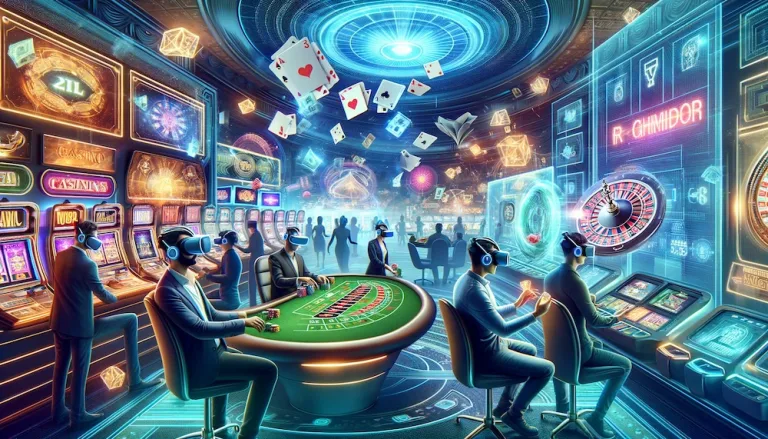Virtual reality (VR) is transforming the gambling industry, providing immersive experiences that bring the excitement of physical casinos into the digital realm. As technology advances, VR is offering players a more engaging and realistic way to enjoy their favorite casino games, creating new opportunities for innovation and growth within the industry. This article explores the impact of VR on gambling, its benefits, challenges, and future prospects.
The Rise of Virtual Reality in Gambling
Early Developments
The concept of virtual reality has been around for decades, but it wasn’t until recent advancements in technology that VR became practical for mainstream use. Early VR gambling experiences were limited and rudimentary, but the rapid improvement of VR headsets, graphics, and processing power has made high-quality, immersive VR gambling a reality.
Modern VR Casinos
Today’s VR casinos offer a wide range of games, from poker and blackjack to slots and roulette, all set in highly realistic virtual environments. Players can navigate these virtual casinos, interact with other players and dealers, and enjoy a gaming experience that closely mimics being in a physical casino. High-definition graphics, 3D sound, and haptic feedback enhance the immersion, making players feel as if they are actually in the casino.
Benefits of VR in Gambling
Immersive Experience
One of the primary benefits of VR in gambling is the immersive experience it provides. Unlike traditional online casinos, which are limited to two-dimensional screens, VR casinos create a three-dimensional environment that players can explore. This level of immersion enhances the excitement and engagement, making the gaming experience more enjoyable.
Social Interaction
VR gambling also fosters social interaction, a key element of traditional casinos that is often missing in online gaming. Players can use avatars to represent themselves in the virtual world, interact with others through voice and text chat, and even participate in multiplayer games. This social aspect adds a new dimension to online gambling, creating a sense of community and camaraderie.
Convenience and Accessibility
VR gambling offers the convenience of online gaming while providing the immersive experience of a physical casino. Players can access VR casinos from the comfort of their homes, avoiding the need to travel to a physical location. This accessibility makes gambling more convenient and appealing to a broader audience.
Challenges of VR in Gambling
Technological Barriers
While VR gambling offers numerous benefits, it also comes with technological requirements. Players need VR headsets and compatible devices to access these virtual environments, which can be costly. Additionally, high-speed internet connections are necessary to ensure smooth gameplay and avoid latency issues.
Learning Curve
For some players, especially those who are not tech-savvy, there may be a learning curve associated with using VR technology. Casinos need to provide user-friendly interfaces and tutorials to help new users get accustomed to the VR experience.
Regulatory and Ethical Issues
As with any form of gambling, VR gambling must adhere to regulatory standards to ensure fair play and protect players. There are also ethical considerations, such as the potential for VR to make gambling more addictive. Developers and operators must implement measures to promote responsible gambling and support players who may be at risk.
The Future of VR in Gambling
Continuous Advancements
The future of VR in gambling looks promising, with continuous advancements in technology expected to enhance the experience further. Improvements in graphics, processing power, and haptic feedback will make VR environments even more realistic and immersive.
Integration with AI
The integration of VR with artificial intelligence (AI) could revolutionize the gambling industry. AI can enhance player interactions, provide personalized gaming experiences, and create intelligent, responsive virtual environments. This combination could lead to more engaging and tailored experiences for players.
Expanding Game Selection
As VR technology becomes more mainstream, the selection of games available in VR casinos is likely to expand. Developers will continue to innovate, creating new and exciting games that take full advantage of the immersive capabilities of VR. This could include skill-based games, interactive story-driven experiences, and more.
Promoting Responsible Gambling in VR
Monitoring and Intervention
VR casinos can implement AI-driven monitoring systems to detect signs of problem gambling. These systems can analyze player behavior and provide real-time interventions, such as reminders to take breaks or set spending limits. This proactive approach can help prevent gambling addiction and promote responsible gaming.
Educational Tools
VR technology can also be used to create educational tools that teach players about responsible gambling practices. Interactive VR experiences can demonstrate the risks of problem gambling, provide information on how to gamble responsibly, and offer resources for those who need help.
Conclusion
Virtual reality is poised to revolutionize the gambling industry by offering immersive, interactive experiences that bring the excitement of physical casinos into the digital world. While there are challenges to overcome, the benefits of VR in gambling are significant. As technology continues to advance, VR casinos will become more sophisticated, providing players with even more engaging and realistic gaming experiences. Whether you’re a seasoned gambler or new to the world of casinos, VR offers a thrilling and innovative way to enjoy your favorite games.

David Garato is a luminary in gaming journalism, renowned for peeling back the curtain on the gaming world with his witty and insightful commentary. A decade into weaving stories from the pixelated edges of indie games to the expansive universes of AAA titles, David’s work is a thrilling blend of analysis and adventure. When not writing, he’s live-streaming, sharing his gaming exploits with an engaged and growing audience. David doesn’t just write about games; he lives them, making him a trusted guide in the gaming community.


